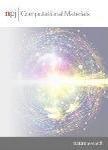Numerical quality control for DFT-based materials databases
作者机构:Fritz-Haber-Institut der Max-Planck-GesellschaftFaradayweg 4-614195BerlinGermany Center for Atomic-scale Materials Design(CAMD)Department of PhysicsTechnical University of DenmarkFysikvej 12800Kongens LyngbyDenmark Physics Department and IRIS AdlershofHumboldt-Universität zu BerlinZum Großen Windkanal 612489BerlinGermany Institute of Solid State PhysicsGraz University of TechnologyNAWI GrazPetergasse 168010GrazAustria
出 版 物:《npj Computational Materials》 (计算材料学(英文))
年 卷 期:2022年第8卷第1期
页 面:661-668页
核心收录:
学科分类:08[工学] 0805[工学-材料科学与工程(可授工学、理学学位)] 080502[工学-材料学]
基 金:This project has received funding from the European Union’s Horizon 2020 research and innovation program under grant agreement No.676580 and No.740233 (TEC1p) O.T.H.and E.W.gratefully acknowledge funding by the Austrian Science Fund,FWF,under the project P27868-N36
主 题:structure precise selecting
摘 要:Electronic-structure theory is a strong pillar of materials *** different computer codes that employ different approaches are used by the community to solve various scientific ***,the precision of different packages has only been scrutinized thoroughly not long ago,focusing on a specific task,namely selecting a popular density functional,and using unusually high,extremely precise numerical settings for investigating 71 monoatomic crystals^(1).Little is known,however,about method- and code-specific uncertainties that arise under numerical settings that are commonly used in *** shed light on this issue by investigating the deviations in total and relative energies as a function of computational *** typical settings for basis sets and k-grids,we compare results for 71 elemental^(1) and 63 binary solids obtained by three different electronic-structure codes that employ fundamentally different *** the basis of the observed trends,we propose a simple,analytical model for the estimation of the errors associated with the basis-set *** cross-validate this model using ternary systems obtained from the Novel Materials Discovery (NOMAD) Repository and discuss how our approach enables the comparison of the heterogeneous data present in computational materials databases.



